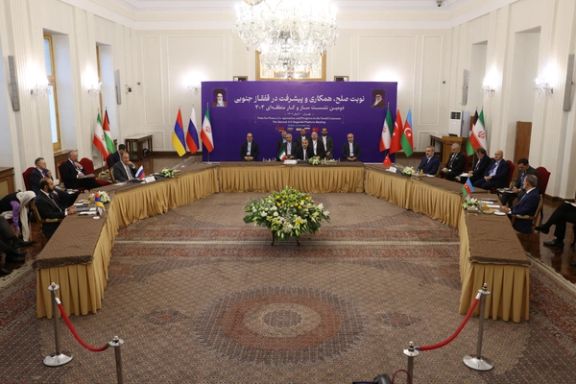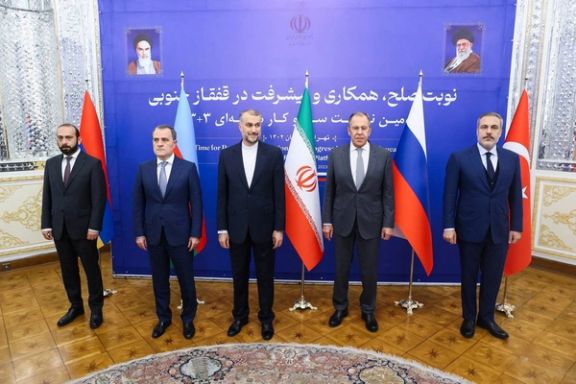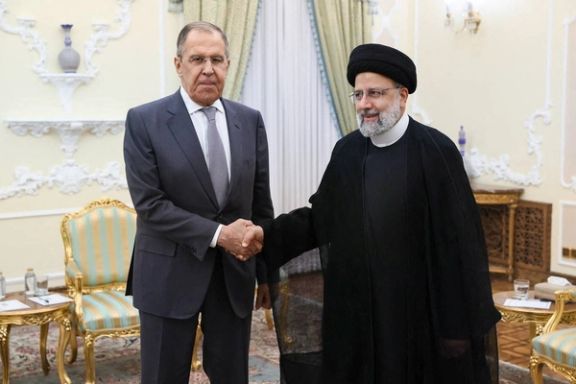Hosting Armenia And Azerbaijan, Iran Says South Caucasus War Is Over

Iran hosted talks between the foreign ministers of Armenia and Azerbaijan on Monday, about a month after Baku recaptured the breakaway region of Nagorno-Karabakh.

Iran hosted talks between the foreign ministers of Armenia and Azerbaijan on Monday, about a month after Baku recaptured the breakaway region of Nagorno-Karabakh.
Russian and Turkish foreign ministers also attended the second 3+3 regional platform summit, dubbed Time for Peace, Cooperation, and Progress in the South Caucasus. The first 3+3 meeting was held in Moscow in December 2021 at the level of deputy foreign ministers. Georgia was no present either of the events.
Armenian Foreign Minister Ararat Mirzoyan and his Azerbaijani counterpart Jeyhun Bayramov met for the first time since Azerbaijan's lightning offensive to recapture the disputed region, which prompted the exodus of most of the region's 120,000 ethnic Armenians. Yerevan has accused Baku of ethnic cleansing, while Azerbaijan said the Armenians left of their own accord and were welcome to return. Christian Armenia and Muslim Azerbaijan have fought two wars in the past three decades and have so far failed to seal a peace deal despite long-running efforts by the United States, EU and Russia.
"A historic opportunity is available to all countries in the region. The war in South Caucasus has ended, and it is time for peace and cooperation," Iran's Foreign Minister Hossein Amir-Abdollahian said. He added, "The presence of outsiders in the region will not only solve any problems but will also complicate the situation further," he added, in an implicit reference to o the United States and the European Union, whose involvement in the search for a peace agreement between Armenia and Azerbaijan has particularly irks Russia.

Iran has close ties with Armenia, which has a more than a three-decade old conflict with Azerbaijan over Nagorno -Karabakh, an Armenian-populated enclave inside Baku's international borders. However, Yerevan is now seeking wider international support and is distancing itself from Moscow, perhaps because Russia is engrossed in its invasion of Ukraine. During the past months, several Iranian military commanders and politicians warned Azerbaijan not to attack Armenia and avoid closing Iran's gateway to Europe via a narrow strip of land connecting Iran via Armenia to Russia and Europe. Iran has also long warned Azerbaijan about its close military relations with Israel, which is the Baku’s main arms supplier.
Tehran's inaction in the face of Azerbaijan's offensive was quite embarrassing for the regime and its military commanders considering months of bragging on IRGC media outlets and social media channels about Iran's swift reaction in case Azerbaijan attacked Karabakh.

Iran's President Ebrahim Raisi, who met with the foreign ministers in separate meetings, said during talks with Armenia's foreign minister, "Given its strong and influential position, Iran is ready to assist in resolving the existing disputes between Azerbaijan and Armenia."
Turkey's Foreign Minister Hakan Fidan, in a statement posted on the X social media platform, said Ankara welcomed Monday's talks in Tehran and hoped they would "give impetus to normalization and peace processes".
The meeting took place against the backdrop of rising tensions in the Middle East, following the October 7 Hamas attack against Israel. Hamas Killed about 1,400 Israelis and took over 220 as hostages. In the retaliatory attacks, over 5,000 Palestinians have been killed while a ground offensive of Gaza seems imminent.
Russian Foreign Minister Sergei Lavrov said in Tehran that unilateral moves to resolve the conflict in the Middle East can only worsen the situation and the United States has not offered any new ideas on tackling the crisis. "The more we have such 'initiatives" from any one state, the greater in general will be the risks, the danger of the conflict growing," he said.
Urging Immediate steps to arrange a ceasefire, resolve humanitarian issues and find a mechanism to work for peace based on the "two state" principle, Lavrov said the United States had halted the work of the Middle East "quartet" and "for now no other body exists that would be acceptable for all. If (US Secretary of State) Antony Blinken has some sort of bright ideas for this, we are unaware of them." The Diplomatic Quartet, comprised of the United Nations, the United States, the European Union, and Russia, was established in early 2000s to mediate the Israeli–Palestinian peace process.